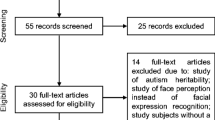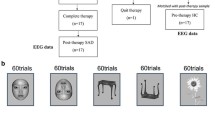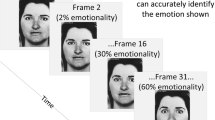Abstract
Background
Impaired processing of emotional expression recognition (EER) has been theorized to be a maintaining factor of social anxiety disorder (SAD). However, the evidence suggesting a decreased ability to recognize emotional facial expressions in this population is mixed.
Methods
We performed a systematic review and meta-analysis investigating the relationship between SAD and EER. We included English peer-reviewed full-text articles with (1) a primary diagnosis of SAD, (2) an EER task using a validated face database, and (3) accuracy and/or reaction time as outcome measures. Risk of Bias was assessed using the RoBANS, and results were synthesized using Comprehensive Meta-Analysis. The literature search took place between April 17, 2020 and January 26, 2022. Sixteen articles (N = 788) were selected from a search of six databases. EER was assessed through accuracy and reaction time, with stimulus duration and comorbidity considered as moderators.
Results
Our results indicate that individuals with SAD may have difficulty recognizing emotional expressions overall, and when presenting with a comorbidity demonstrate poorer performance at recognizing happy facial expressions. Individuals with SAD also take a greater amount of time to recognize happy facial expressions.
Conclusion
Our results suggest that individuals with SAD demonstrate poorer performance in accurately recognizing various expressions, such as happy facial expressions. Given the narrow aim of this study, some results are underpowered.





Similar content being viewed by others
References
Ambrosini, P. (2000). Historical development and present status of the schedule for affective disorders and schizophrenia for school-age children (K-SADS). Journal of the American Academy of Child and Adolescent Psychiatry, 39(1), 49–58. https://doi.org/10.1097/00004583-200001000-00016
American Psychiatric Association. (2013). Diagnostic and statistical manual of mental disorders. American Psychiatric Association.
Bandelow, B., Sagebiel, A., Belz, M., Görlich, Y., Michaelis, S., & Wedekind, D. (2018). Enduring effects of psychological treatments for anxiety disorders: Meta-analysis of follow-up studies. British Journal of Psychiatry, 212(6), 333–338. https://doi.org/10.1192/bjp.2018.49
Bantin, T., Stevens, S., Gerlach, A. L., & Hermann, C. (2016). What does the facial dot-probe task tell us about attentional processes in social anxiety? A systematic review. Journal of Behavior Therapy and Experimental Psychiatry, 50, 40–51. https://doi.org/10.1016/j.jbtep.2015.04.009
Bar-Haim, Y., Lamy, D., Pergamin, L., Bakermans-Kranenburg, M. J., & van IJzendoorn, M. H. (2007). Threat-related attentional bias in anxious and nonanxious individuals: A meta-analytic study. Psychological Bulletin, 133(1), 1–24. https://doi.org/10.1037/0033-2909.133.1.1
Beaudry, O., Roy-Charland, A., Perron, M., Cormier, I., & Tapp, R. (2014). Featural processing in recognition of emotional facial expressions. Cognition and Emotion, 28(3), 416–432. https://doi.org/10.1080/02699931.2013.833500
Beidel, D., Turner, S., Hamlin, K., & Morris, T. (2000). The social phobia and anxiety inventory for children (SPAI-C): External and discriminative validity. Behavior Therapy, 31(1), 75–87. https://doi.org/10.1016/S0005-7894(00)80005-2
Binelli, C., Subira, S., Batalla, A., Muniz, A., Sugranyes, G., Crippa, J. A., Farre, M., Perez-Jurado, L., & Martin-Santos, R. (2015). Common and distinct neural correlates of facial emotion processing in social anxiety disorder and Williams syndrome: A systematic review and voxel-based meta-analysis of functional resonance imaging studies. Neuropsychologia, 64, 205–217. https://doi.org/10.1016/j.neuropsychologia.2014.08.027
Birmaher, B., Brent, D., Chiappetta, L., Bridge, J., Monga, S., & Baugher, M. (1999). Psychometric properties of the screen for child anxiety related emotional disorders (SCARED): A replication study. Journal of the American Academy of Child and Adolescent Psychiatry, 38(10), 1230–1236. https://doi.org/10.1097/00004583-199910000-00011
Boll, S., Bartholomaeus, M., Peter, U., Lupke, U., & Gamer, M. (2016). Attentional mechanisms of social perception are biased in social phobia. Journal of Anxiety Disorders, 40, 83–93. https://doi.org/10.1016/j.janxdis.2016.04.004
Borenstein, M. (2009). Introduction to meta-analysis. Wiley. https://doi.org/10.1002/9780470743386
Borenstein, M. (2019). Common mistakes in meta-analysis. Biostat., 2019, 10.
Calvo, M. G., & Nummenmaa, L. (2016). Perceptual and affective mechanisms in facial expression recognition: An integrative review. Cognition and Emotion, 30(6), 1081–1106. https://doi.org/10.1080/02699931.2015.1049124
Chen, J., van den Bos, E., & Westenberg, P. M. (2020). A systematic review of visual avoidance of faces in socially anxious individuals: Influence of severity, type of social situation, and development. Journal of Anxiety Disorders, 70, 102193. https://doi.org/10.1016/j.janxdis.2020.102193
Chen, W., Lander, K., & Liu, C. H. (2011). Matching faces with emotional expressions. Frontiers in Psychology, 2, 206–206. https://doi.org/10.3389/fpsyg.2011.00206
Cooney, R. E., Atlas, L. Y., Joormann, J., Eugène, F., & Gotlib, I. H. (2006). Amygdala activation in the processing of neutral faces in social anxiety disorder: Is neutral really neutral? Psychiatry Research, 148(1), 55–59. https://doi.org/10.1016/j.pscychresns.2006.05.003
Cremers, H., Veer, I., Spinhoven, P., Rombouts, S. A. R., & Roelofs, K. (2015). Neural sensitivity to social reward and punishment anticipation in social anxiety disorder. Frontiers in Behavioral Neuroscience, 8, 439–439. https://doi.org/10.3389/fnbeh.2014.00439
Dalili, M., Penton-Voak, I., Harmer, C., & Munafò, M. (2015). Meta-analysis of emotion recognition deficits in major depressive disorder. Psychological Medicine, 45(6), 1135–1144. https://doi.org/10.1017/S0033291714002591
Davies, H., Wolz, I., Leppanen, J., Fernandez-Aranda, F., Schmidt, U., & Tchanturia, K. (2016). Facial expression to emotional stimuli in non-psychotic disorders: A systematic review and meta-analysis. Neuroscience and Biobehavioral Reviews, 64, 252–271. https://doi.org/10.1016/j.neubiorev.2016.02.015
Demenescu, L. R., Kortekaas, R., Cremers, H., Renken, R., van Tol, M., van der Wee, N. J., Veltman, D., den Boer, J., Roelofs, K., & Aleman, A. (2013). Amygdala activation and its functional connectivity during perception of emotional faces in social phobia and panic disorder. Journal of Psychiatric Research, 47(8), 1024–1031.
Demenescu, L. R., Kortekaas, R., den Boer, J. A., & Aleman, A. (2010). Impaired attribution of emotion to facial expressions in anxiety and major depression. PLoS ONE, 5(12), 1–5. https://doi.org/10.1371/journal.pone.0015058
Ekman, P. (1972). Universals and cultural differences in facial expressions of emotions. In J. Cole (Ed.), Nebraska symposium on motivation (pp. 207–282). University of Nebraska Press.
Esteves, F., & Öhman, A. (1993). Masking the face: Recognition of emotional facial expressions as a function of the parameters of backward masking. Scandinavian Journal of Psychology, 34(1), 1–18. https://doi.org/10.1111/j.1467-9450.1993.tb01096.x
Fistikci, N., Saatcioğlu, Ö., Keyvan, A., Kalkan, M., & Topçuoğlu, V. (2015). Attentional bias and training in social anxiety disorder. Nöropsikiyatri Arşivi, 52(1), 4–7. https://doi.org/10.5152/npa.2015.8777
Gilboa-Schechtman, E., Foa, E. B., & Amir, N. (1999). Attentional biases for facial expressions in social phobia: The face-in-the-crowd paradigm. Cognition and Emotion, 13(3), 305–318. https://doi.org/10.1080/026999399379294
Gomes Claudino, R., de Lima, L. K. S., de Assis, E. D. B., & Torro, N. (2019). Facial expressions and eye-tracking in individuals with social anxiety disorder: a systematic review. Psicologia: Reflexão e Crítica, 32(9), 1–10. https://doi.org/10.1186/s41155-019-0121-8
Gray, V., Douglas, K. M., & Porter, R. J. (2020). Emotion processing in depression and anxiety disorders in older adults: Systematic review. Bjpsych Open, 7(1), 1–11. https://doi.org/10.1192/bjo.2020.143
Günther, V., Kropidlowski, A., Schmidt, F. M., Koelkebeck, K., Kersting, A., & Suslow, T. (2021). Attentional processes during emotional face perception in social anxiety disorder: A systematic review and meta-analysis of eye-tracking findings. Progress in Neuro-Psychopharmacology & Biological Psychiatry, 111, 110353–110353. https://doi.org/10.1016/j.pnpbp.2021.110353
Gur, R. C., Schroeder, L., Turner, T., McGrath, C., Chan, R. M., Turetsky, B. I., Alsop, D., Maldjian, J., & Gur, R. E. (2002). Brain activation during facial emotion processing. NeuroImage, 16(3), 651–662. https://doi.org/10.1006/nimg.2002.1097
Hale, W., Crocetti, E., Raaijmakers, Q., & Meeus, W. (2011). A meta-analysis of the cross-cultural psychometric properties of the screen for child anxiety related emotional disorders (SCARED). Journal of Child Psychology and Psychiatry, 52(1), 80–90. https://doi.org/10.1111/j.1469-7610.2010.02285.x
Hang, Y., Xu, L., Wang, C., Zhang, G., & Zhang, N. (2021). Can attention bias modification augment the effect of CBT for anxiety disorders? A systematic review and meta-analysis. Psychiatry Research, 299, 113892–113892. https://doi.org/10.1016/j.psychres.2021.113892
Högström, J., Nordh, M., Larson Lindal, M., Taylor, E., Serlachius, E., & Lundin Kleberg, J. (2019). Visual attention to emotional faces in adolescents with social anxiety disorder receiving cognitive behavioral therapy. PLoS ONE, 14(11), e0225603. https://doi.org/10.1371/journal.pone.0225603
Horstmann, G. (2002). Facial expressions of emotion: Does the prototype represent central tendency, frequency of instantiation, or an ideal? Emotion, 2(3), 297–305. https://doi.org/10.1037/1528-3542.2.3.297
Hudd, T., & Moscovitch, D. A. (2020). Coping with social wounds: How social pain and social anxiety influence access to social rewards. Journal of Behavior Therapy and Experimental Psychiatry, 68, 101572–101572. https://doi.org/10.1016/j.jbtep.2020.101572
Hudd, T., & Moscovitch, D. A. (2023). Social anxiety inhibits needs repair following exclusion in both relational and non-relational reward contexts: The mediating role of positive affect. Behaviour Research and Therapy, 162, 104270–104270. https://doi.org/10.1016/j.brat.2023.104270
Hunsley, J., & Mash, E. (2018). A guide to assessments that work (2nd ed.). Oxford University Press.
Kashdan, T. B., Farmer, A. S., Adams, L. M., Ferssizidis, P., McKnight, P. E., & Nezlek, J. B. (2013). Distinguishing healthy adults from people with social anxiety disorder: Evidence for the value of experiential avoidance and positive emotions in everyday social interactions. Journal of Abnormal Psychology, 122(3), 645–655. https://doi.org/10.1037/a0032733
Kim, S., Park, J., Lee, Y., Seo, H., Sheen, S., Hahn, S., Jang, B., & Son, H. (2013). Testing a tool for assessing the risk of bias for nonrandomized studies showed moderate reliability and promising validity. Journal of Clinical Epidemiology, 66(4), 408–414. https://doi.org/10.1016/j.jclinepi.2012.09.016
Kivity, Y., & Huppert, J. D. (2016). Emotional reactions to facial expressions in social anxiety: A meta-analysis of self-reports. Emotion Review, 8(4), 367–375. https://doi.org/10.1177/1754073915594436
Kleberg, H., Hanqvist, C., Serlachius, E., & Högström, J. (2019). Pupil dilation to emotional expressions in adolescent social anxiety disorder is related to treatment outcome. Journal of Anxiety Disorders, 65, 26–33. https://doi.org/10.1016/j.janxdis.2019.04.006
Klumpp, P., Post, D., Angstadt, M., Fitzgerald, D. A., & Luan Phan, K. (2013). Anterior cingulate cortex and insula response during indirect and direct processing of emotional faces in generalized social anxiety disorder. Biology of Mood & Anxiety Disorders, 3(1), 7–7. https://doi.org/10.1186/2045-5380-3-7
Kolassa, I. T., & Miltner, W. H. (2006). Psychophysiological correlates of face processing in social phobia. Brain research, 1118(1), 130–141. https://doi.org/10.1016/j.brainres.2006.08.019
Lecomte, T., Théroux, L., Paquin, K., Potvin, S., & Achim, A. (2019). Can social anxiety Impact facial emotion recognition in schizophrenia?. The Journal of Nervous and Mental Disease, 207(3), 140–144. https://doi.org/10.1097/NMD.0000000000000934
Letamendi, A. M., Chavira, D. A., & Stein, M. B. (2009). Issues in the assessment of social phobia: a review. The Israel Journal of Psychiatry and Related Sciences, 46(1), 13–24.
Levy, Y., & Bentin, S. (2008). Interactive processes in matching identity and expressions of unfamiliar faces: Evidence for mutual facilitation effects. Perception, 37(6), 915–930. https://doi.org/10.1068/p5925
Maoz, E., Eldar, S., Stoddard, J., Pine, D. S., Leibenluft, E., & Bar-Haim, Y. (2016). Angry-happy interpretations of ambiguous faces in social anxiety disorder. Psychiatry Research, 241, 122–127. https://doi.org/10.1016/j.psychres.2016.04.100
Melfsen, S., & Florin, I. (2002). Do socially anxious children show deficits in classifying facial expressions of emotions? Journal of Nonverbal Behavior, 26(2), 109–126. https://doi.org/10.1023/A:1015665521371
Mogg, K., Philippot, P., & Bradley, B. P. (2004). Selective attention to angry faces in clinical social phobia. Journal of Abnormal Psychology, 113(1), 160–165. https://doi.org/10.1037/0021-843X.113.1.160
Mohlman, J., Carmin, C. N., & Price, R. B. (2007). Jumping to interpretations: Social anxiety disorder and the identification of emotional facial expressions. Behaviour Research and Therapy, 45(3), 591–599. https://doi.org/10.1016/j.brat.2006.03.007
Oh, K. S., Lee, W. H., Kim, S., Shin, D. W., Shin, Y. C., & Lim, S. W. (2018). Impaired facial expression recognition in patients with social anxiety disorder: A case-control study. Cognitive Neuropsychiatry, 23(4), 218–228. https://doi.org/10.1080/13546805.2018.1462695
Peschard, V., Philippot, P., Joassin, F., & Rossignol, M. (2013). The impact of the stimulus features and task instructions on facial processing in social anxiety: An ERP investigation. Biological Psychology, 93(1), 88–96. https://doi.org/10.1016/j.biopsycho.2013.01.009
Plana, I., Lavoie, M. A., Battaglia, M., & Achim, A. M. (2014). A meta-analysis and scoping review of social cognition performance in social phobia, posttraumatic stress disorder and other anxiety disorders. Journal of Anxiety Disorders, 28(2), 169–177. https://doi.org/10.1016/j.janxdis.2013.09.005
Plutchik, R. (2001). The nature of emotions: Human emotions have deep evolutionary roots, a fact that may explain their complexity and provide tools for clinical practice. American Scientist, 89(4), 344–350.
Ran, G., & Chen, X. (2017). The impact of top-down prediction on emotional face processing in social anxiety. Frontiers in Psychology, 8, 1269. https://doi.org/10.3389/fpsyg.2017.01269
Rapee, R., & Heimberg, R. (1997). A cognitive-behavioral model of anxiety in social phobia. Behaviour Research and Therapy, 35(8), 741–756. https://doi.org/10.1016/s0005-7967(97)00022-3
Rawdon, C., Murphy, D., Motyer, G., Munafò, M. R., Penton-Voak, I., & Fitzgerald, A. (2018). An investigation of emotion recognition training to reduce symptoms of social anxiety in adolescence. Psychiatry Research, 263, 257–267. https://doi.org/10.1016/j.psychres.2018.02.023
Richey, J. A., Brewer, J. A., Sullivan-Toole, H., Strege, M. V., Kim-Spoon, J., White, S. W., & Ollendick, T. H. (2019). Sensitivity shift theory: A developmental model of positive affect and motivational deficits in social anxiety disorder. Clinical Psychology Review, 72, 101756–101756. https://doi.org/10.1016/j.cpr.2019.101756
Russell, J. A. (1993). Forced-choice response format in the study of facial expression. Motivation and Emotion, 17(1), 41–51. https://doi.org/10.1007/BF00995206
Saint, S. A., & Moscovitch, D. A. (2021). Effects of mask-wearing on social anxiety: An exploratory review. Anxiety, Stress, and Coping, 34(5), 487–502. https://doi.org/10.1080/10615806.2021.1929936
Sheehan, D. V., Lecrubier, Y., Harnett-Sheehan, K., Amorim, P., Janavs, J., Weiller, E., Hergueta, T., Baker, R., & Dunbar, G. (1998). The mini international neuropsychiatric interview (MINI): The development and validation of a structured diagnostic psychiatric interview. Journal of Clinical Psychiatry, 59(20), 22–33.
Spence, S. H., & Rapee, R. M. (2016). The etiology of social anxiety disorder: An evidence-based model. Behaviour Research and Therapy, 86, 50–67. https://doi.org/10.1016/j.brat.2016.06.007
Stein, D. J., Lim, C. C. W., Roest, A. M., et al. (2017). The cross-national epidemiology of social anxiety disorder: Data from the World mental health survey initiative. BMC Medicine, 15, 143. https://doi.org/10.1186/s12916-017-0889-2
Storch, E. A., Masia-Warner, C., Heidgerken, A. D., et al. (2006). Factor structure of the Liebowitz social anxiety scale for children and adolescents. Child Psychiatry and Human Development, 37, 25–37. https://doi.org/10.1007/s10578-006-0017-6
Straube, T., Kolassa, I. T., Glauer, M., Mentzel, H. J., & Miltner, W. H. (2004). Effect of task conditions on brain responses to threatening faces in social phobics: An event-related functional magnetic resonance imaging study. Biological Psychiatry, 56(12), 921–930. https://doi.org/10.1016/j.biopsych.2004.09.024
Taylor, S. J., Barker, L. A., Heavey, L., & McHale, S. (2015). The longitudinal development of social and executive functions in late adolescence and early adulthood. Frontiers in Behavioral Neuroscience, 9, 252. https://doi.org/10.3389/fnbeh.2015.00252
Thomas, L. A., De Bellis, M. D., Graham, R., & LaBar, K. S. (2007). Development of emotional facial recognition in late childhood and adolescence. Developmental Science, 10(5), 547–558. https://doi.org/10.1111/j.1467-7687.2007.00614.x
Torro-Alves, N., de Bezerra, I. A. O., Claudino, R. G., Rodrigues, M. R., Machado-de-Sousa, J. P., de Osório, F. L., & Crippa, J. A. (2016). Facial emotion recognition in social anxiety: The influence of dynamic information. Psychology & Neuroscience, 9(1), 1–11. https://doi.org/10.1037/pne0000042
Townsend, L., Kobak, K., Kearney, C., Milham, M., Andreotti, C., Escalera, J., Alexander, L., Gill, M., Birmaher, B., Sylvester, R., Rice, D., Deep, A., & Kaufman, J. (2020). Development of three web-based computerized versions of the kiddie schedule for affective disorders and schizophrenia child psychiatric diagnostic interview: preliminary validity data. Journal of the American Academy of Child and Adolescent Psychiatry, 59(2), 309–325. https://doi.org/10.1016/j.jaac.2019.05.009
Tseng, H., Huang, Y. L., Chen, J. T., Liang, K. Y., Lin, C. C., & Chen, S. H. (2017). Facial and prosodic emotion recognition in social anxiety disorder. Cognitive Neuropsychiatry, 22(4), 331–345. https://doi.org/10.1080/13546805.2017.1330190
Wong, N., Beidel, D. C., Sarver, D. E., & Sims, V. (2012). Facial emotion recognition in children with high functioning autism and children with social phobia. Child Psychiatry & Human Development, 43, 775–794. https://doi.org/10.1007/s10578-012-0296-z
Wong, Q., & Rapee, R. (2016). The aetiology and maintenance of social anxiety disorder: A synthesis of complementary theoretical models and formulation of a new integrated model. Journal of Affective Disorders, 203, 84–100. https://doi.org/10.1016/j.jad.2016.05.069
Xing, F., Fitzgerald, J. M., & Klumpp, H. (2020). Classification of social anxiety disorder with support vector machine analysis using neural correlates of social signals of threat. Frontiers in Psychiatry, 11, 144–144. https://doi.org/10.3389/fpsyt.2020.00144
Yitzhak, N., Pertzov, Y., Guy, N., & Aviezer, H. (2022). Many ways to see your feelings: Successful facial expression recognition occurs with diverse patterns of fixation distributions. Emotion, 22(5), 844–860. https://doi.org/10.1037/emo0000812
Acknowledgements
The authors would like to thank Patrick Labelle, the University of Ottawa librarian, for his help in developing the search strategy for this systematic review and meta-analysis.
Funding
The authors did not receive support from any organization for the submitted work.
Author information
Authors and Affiliations
Contributions
Conceptualization: CL. Methodology: CL, CC. Literature search: CL. Study selection: CL, KE, KS, CC. Data analysis: CL, Manuscript writing: CL, CC. Manuscript revision: CL, CC, KS.
Corresponding author
Ethics declarations
Conflict of interest
Corina Lacombe, Kathryn Simoneau, Karine Elalouf and Charles Collin declare that they have no conflict of interest.
Informed Consent and Animal Rights
No animal studies were carried out by the authors for this article.
Additional information
Publisher's Note
Springer Nature remains neutral with regard to jurisdictional claims in published maps and institutional affiliations.
Supplementary Information
Below is the link to the electronic supplementary material.
Rights and permissions
Springer Nature or its licensor (e.g. a society or other partner) holds exclusive rights to this article under a publishing agreement with the author(s) or other rightsholder(s); author self-archiving of the accepted manuscript version of this article is solely governed by the terms of such publishing agreement and applicable law.
About this article
Cite this article
Lacombe, C., Simoneau, K., Elalouf, K. et al. The Impact of Social Anxiety Disorder on Emotional Expression Recognition: A Meta-analysis. Cogn Ther Res 47, 732–751 (2023). https://doi.org/10.1007/s10608-023-10376-7
Accepted:
Published:
Issue Date:
DOI: https://doi.org/10.1007/s10608-023-10376-7




